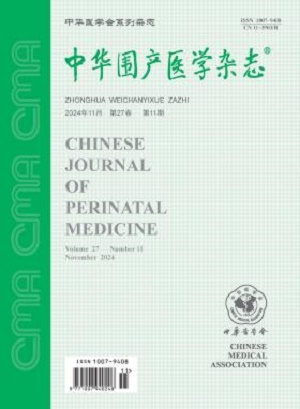Vaginal delivery after 37 days of a convalescent pregnant woman with COVID-19: a case report/ 中华围产医学杂志
Q4 Medicine
引用次数: 1
Abstract
We present a case report of a healthy neonate born by vaginal delivery to a woman who had recovered from COVID-19 after 37 days of discharge. The pregnant woman had fever, cough, and chills at 33+1 gestational weeks and was diagnosed with COVID-19 by coronavirus nucleic acid test one day later. She recovered and was discharged after a series of treatments, and the 2019 novel coronavirus nucleic acid test was negative and pulmonary CT was normal at the 2nd and 4th week after being discharged. The patient was admitted due to threatened labor at 38+4 gestational weeks and delivered a healthy newborn vaginally on that day. Both the mother and the baby were in good condition. All the maternal or neonatal specimens taken in the delivery room for 2019 novel coronavirus nucleic acid tests were negative, including the maternal pharynx, rectal and cervical secretions before delivery, amniotic fluid, and colostrum neonatal pharynx and rectal swabs after birth. The qualitative examination of 2019 novel coronavirus antibodies in the maternal venous blood test before delivery showed that both IgG and IgM were positive. While the same test for neonatal cord blood and femoral vein blood showed negative results. No inflammatory reaction was found in the placenta and immunohistochemistry detection of novel coronavirus N protein was negative. The mother and newborn were observed and treated postnatally in the same ward; neither of them had fever, cough, or fatigue, and were discharged three days after delivery. The qualitative examination of 2019 novel coronavirus antibodies (IgM and IgG) in the femoral vein blood of the neonate at 27 days old showed negative results. Key words: Coronavirus infections; Pregnancy complications, infectious; Parturition新冠肺炎康复期孕妇37天后阴道分娩1例报告/中华围产医学杂志
我们报告了一名健康新生儿的病例报告,该新生儿是一名出院37天后从新冠肺炎中康复的女性通过阴道分娩出生的。该孕妇在妊娠33+1周时出现发烧、咳嗽和发冷,一天后通过冠状病毒核酸检测诊断为新冠肺炎。经一系列治疗康复出院,出院后第2、4周2019年新型冠状病毒核酸检测均为阴性,肺部CT正常。患者在孕38+4周时因临产威胁入院,当天阴道分娩了一名健康的新生儿。母亲和婴儿的情况都很好。2019年新型冠状病毒核酸检测在产房采集的孕产妇或新生儿标本均为阴性,包括分娩前的孕产妇咽部、直肠和宫颈分泌物、羊水以及分娩后的产粪新生儿咽部和直肠拭子。产前孕妇静脉血试验中2019新型冠状病毒抗体定性检查显示,IgG和IgM均呈阳性。而新生儿脐带血和股静脉血的相同检测结果为阴性。胎盘未见炎症反应,新型冠状病毒N蛋白免疫组化检测阴性。母亲和新生儿在同一病房进行产后观察和治疗;两人都没有发烧、咳嗽或疲劳,产后三天出院。27日龄新生儿股静脉血中2019新型冠状病毒抗体(IgM和IgG)定性检测结果为阴性。关键词:冠状病毒感染;妊娠并发症,传染性;分娩
本文章由计算机程序翻译,如有差异,请以英文原文为准。
求助全文
约1分钟内获得全文
求助全文
来源期刊

中华围产医学杂志
Medicine-Obstetrics and Gynecology
CiteScore
0.70
自引率
0.00%
发文量
4446
期刊介绍:
Chinese Journal of Perinatal Medicine was founded in May 1998. It is one of the journals of the Chinese Medical Association, which is supervised by the China Association for Science and Technology, sponsored by the Chinese Medical Association, and hosted by Peking University First Hospital. Perinatal medicine is a new discipline jointly studied by obstetrics and neonatology. The purpose of this journal is to "prenatal and postnatal care, improve the quality of the newborn population, and ensure the safety and health of mothers and infants". It reflects the new theories, new technologies, and new progress in perinatal medicine in related disciplines such as basic, clinical and preventive medicine, genetics, and sociology. It aims to provide a window and platform for academic exchanges, information transmission, and understanding of the development trends of domestic and foreign perinatal medicine for the majority of perinatal medicine workers in my country.
 求助内容:
求助内容: 应助结果提醒方式:
应助结果提醒方式:


